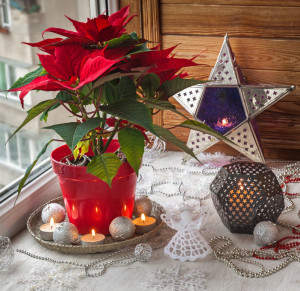As the chilly winds wake us up to the reality that winter is here, we gather up our outdoor plants and bring them in to safety. The vegetable plants succumb to a frosty covering as green tomato stems and leaves wilt like cooked spinach and the blooms of fall mums and marigolds wither.
If you are paying attention to the weather forecast, you may dig a few plants or herbs from the garden to bring indoors for the winter before the first hard frost. As you bring in sensitive garden plants and potted plants from your patio, your home transforms into a cozy lush landscape and you can enjoy some green over the winter.
If you have sturdy, weather-resistant plant markers and plant labels then there is no need to bring those markers indoors, but consider how interesting those markers may look in your potted houseplants. Plant labels help us remember plant names and help us relay this information to our visitors. When plants are labeled it shows their importance in the home.
Some people “use” rather than “choose” plants. They use plants to hide an ugly corner of the room or a stain on a table or rug. The end result is still adding beauty to the room, but then there are others who “choose” plants. Those gardeners carefully mull over foliage shapes, textures and hues. They research about care for their plants, where the plant needs to be in the house in order to survive and thrive.
 Simple, classic plant labels bring character to your precious plants. They draw your visitors over to your plants and those plants aren’t passed by like an empty vase on a bookshelf. While some labels may give names to your greenery, others may be more personal. A plant passed down to you from your grandmother might include her name on the label or one given to you on a special occasion may be “Our Wedding Peace Lily.”
Simple, classic plant labels bring character to your precious plants. They draw your visitors over to your plants and those plants aren’t passed by like an empty vase on a bookshelf. While some labels may give names to your greenery, others may be more personal. A plant passed down to you from your grandmother might include her name on the label or one given to you on a special occasion may be “Our Wedding Peace Lily.”
Other labels may help others identify the variety of plant in your home. 220 million poinsettias will be sold in the next month as their beauty fills homes, businesses and churches across the nation. Amazingly, there are over 100 varieties of this popular Christmas plant. Tending for your poinsettia involves monitoring its light and darkness exposure and its soil moisture as well as pruning it back at the right times. If you are one of the lucky gardeners to help it thrive, you might label your plant with the year, “Christmas 2014” and see it rejuvenate and bloom each Christmas season.
Celebrate your indoor plants as well as your outdoor plants by using plant labels and markers like the ones designed by Kincaid Plant Markers. Our 100 percent stainless steel plant markers are designed to withstand the outdoor elements, but their simple beauty can also adorn your indoor plants any season of the year.

Identify Your Plants in Your Pots and Get Them Off to a Good Start | Kincaid Plant Markers
[…] the soil ends up in different steps when you are planting outdoors or indoors. Never put a plant in soaking soil. Muddy soil may have air pockets where the roots may not be able […]